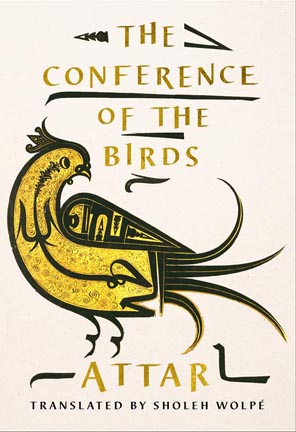Parable of the Crack in the Palace Wall – An excerpt from The Conference of the Birds by Attar, 12th Century Sufi Mystic Poet. Translated by Sholeh Wolpé. Published by W. W. Norton & Company in March 2017. LINK
Attar, also referred to as Attar of Nishapur or Farid ud-Din Attar, was born in northeastern Iran around 1145 CE and died a violent death in the massacre inflicted by Genghis Khan and the Mongol army on the city of Nishapur in 1220.
The Conference of the Birds (Manteq al-Tayr) is an allegorical epic poem about our human struggle, both physical and spiritual. It is peppered with beguiling parables. Indeed, this method of storytelling through poetry was later adopted by future master poets, namely Hafiz and Rumi. Attar’s use of everyday details, stories, and historical chronicles is a masterful technique he invented to animate the deeper meanings of what we consider “reality.”
The story goes as follows: The birds of the world, representing the mystics, gather and acknowledge the Great Simorgh as their King. Simorgh is a mysterious bird who dwells in Mount Qaf, a mythical mountain that wraps around the world. The great and perilous journey is led by the Hoopoe. At the start, each bird presents an elaborate excuse for not being able to make the journey, but the wise Hoopoe addresses their many hesitations, complaints, fears, vanities and questions. Their journey takes them across seven valleys—the valley of the Quest, of Love, of Knowledge, Detachment, Unity, Wonderment, and Poverty and Annihilation. Upon reaching their destination, the surviving birds find realize they themselves are the Simorgh, just as water drops are part of the great ocean.
About this translation, Azar Nafisi, author of Reading Lolita in Tehran, writes: “In this beautiful rendering of Attar’s Conference of the Birds, Sholeh Wolpé, herself a passionate poet, transports us to another time, another language & another world, while reminding us of how enduring and universal great works of imagination are, how they create spaces within which we not only acknowledge and appreciate our differences but also recognize & celebrate our shared humanity. Only a true poet could achieve such a feat.”
A prince built himself a golden palace, spending money on it in a hundred ways. When the magnificent palace was finally finished, he decorated it with fine carpets and other luxuries. Many came from far and wide to see the splendid abode. Servants bearing trays of food greeted the guests.
The prince then summoned his sages and close friends, seated them around himself and asked: “Is there any beauty or luxury missing from this palace of mine? Is it not absolutely perfect?”
They all agreed they had not seen such a place on earth. But a pious fellow amongst them sprang up and said: “Fortunate one, there is a crack in one of the walls, and that makes the palace imperfect. Indeed, if it weren’t for this fatal flaw, this heavenly residence would be like a gift from the Invisible.”
The king replied: “Ignorant man, what an inflammatory remark! I have not seen a crack anywhere.”
The man replied: “Proud king, there is a crack, and it opens to Azrael, the Archangel of Death. If only you could mend that crack! Otherwise, what good is this palace, crown, or throne? This palace may be as delightful as a paradise now, but soon enough death will make it foul in your eyes. Nothing is immortal. You have a life here now, but beware, it’s ephemeral. Don’t take such pride in your home or mansion; don’t ride so haughtily on the steed of arrogance. I pity you, king, when a man like me has to explain to a man like you this fatal flaw.”
© Sholeh Wolpé



